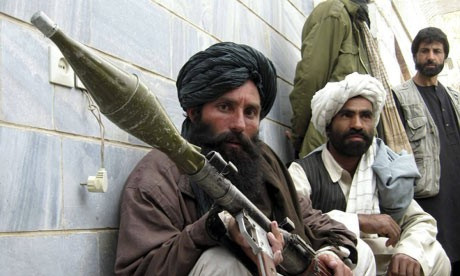Taliban Chiefs Admit Close Links to Pakistan Intelligence, Military

Commanders of the Taliban told the BBC that they and thousands of other members of their groups were trained and armed by Pakistan’s military intelligence and security service.
They also said that Pakistan security services provided weapons to Taliban insurgents who are battling U.S., Afghan and western troops in Afghanistan.
The explosive charges are made in a BBC documentary that will undoubtedly raise the ire of the U.S. and NATO who have long suspected that Pakistan’s Inter-Services Intelligence (ISI) intelligence agency has had a working relationship with the militant groups they are supposed to be fighting.
One of the Taliban chiefs, Mullah Qaseem, reportedly told the BBC: “Pakistan plays a significant role. First they support us by providing a place to hide which is really important. Secondly they provide us with weapons.
Other Taliban officials described how Pakistan provided training in a network of military camps in the country.
One such commander, Mullah Azizullah, said these camps are run by the ISI or are closely linked to it.
“They are all the ISI’s men,” he said. “They are the ones who run the training. First they train us about [sic] bombs; then they give us practical guidance. Their generals are everywhere. They are present during the training.
He added: The Taliban movement was created with the help of the ISI. It is like when a tree grows – one has to plant it and water it.
Yet another Taliban warrior, known as Commander Najib, said these camps also included al-Qaida fighters.
“I was in the camp for a month … They were giving us practical training in whatever weapons we specialized in… Suicide bombers were taken to a different section and were kept apart from us. Those who were taught to be suicide bombers were there,” he said.
In addition, Amrullah Saleh, a former chief of Afghan intelligence told BBC that his government provided information to then-Pakistan president, Pervez Musharraf about the whereabouts of al-Qaida chieftain Osama bin Laden in northern Pakistan – very near the location where he was eventually killed in May of this year.
However, he claims that Musharraf did nothing about this intelligence.
In fact, Saleh said he and Afghan President Hamid Karzai took the information to the Pakistani President, who reacted bizarrely.
“He [Musharraf] banged the table and looked at President Karzai and said, ‘Am I president of a banana republic? If not, then how can you tell me bin Laden is hiding in a settled area of Pakistan?' I said ‘Well, this is the information so you can go and check it,'” said Saleh.”
These revelations will likely come as no surprise to senior U.S. officials like Mike Mullen, the former chairman of the joint chiefs of staff, who openly accused the ISI of working in league with terrorist groups who have waged attacks on western targets in Afghanistan, including the U.S. embassy on Kabul.
Pakistan has strongly denied the BBC’s report.
General Athar Abbas, director-general of the Inter Services public relations and official spokesman for the Pakistan military, told the BBC: “To say that these militant groups were being supported by the state with the organized camps in these areas… I think nothing could be further from the truth.”
However, more evidence seems to be piling up against Pakistan.
The British newspaper Daily Telegraph reported that Lt. Col. Tony Shaffer, who served with U.S. Defense Intelligence between 1995 and 2006, said that ISI helped Ayman al-Zawahiri, the current leader of al-Qaida, to escape a battle with Pakistani troops in Wana in South Waziristan in 2004.
We found out ... that 24 hours before going in… Zawahiri was given fair warning, 'You're about to be attacked, you'd better skedaddle,' he said.
And the reason being because the ISI was able to give tip off information to the al-Qaida and Taliban folks in the safe haven and allow them to escape ahead of the attack.
Similarly, Col. Richard Kemp, who worked at the UK Cabinet Office as chief of intelligence on international terrorism between 2001 and 2006, said the ISI could have helped to prevent the July 7 terrorist attacks in London in 2005.
The ISI of course must take responsibility for the fact that some of these camps were still up and running including perhaps the camp that, that was responsible for training the 7/7 attackers, he said.
The Telegraph also said that Bruce Riedel, a former CIA officer, told President Barack Obama that Pakistan is “double-dealing us and that the Pakistanis had been double-dealing the United States and its allies for years and years, and they were probably going to continue to do so.
© Copyright IBTimes 2025. All rights reserved.





















